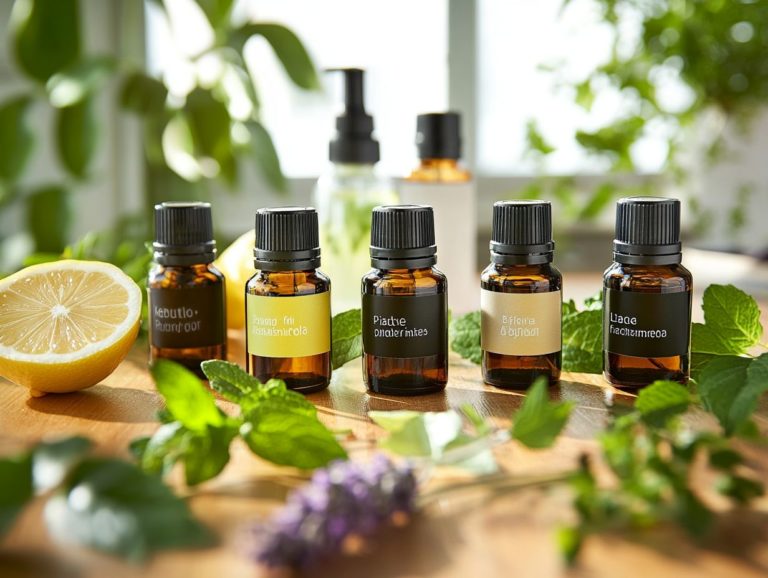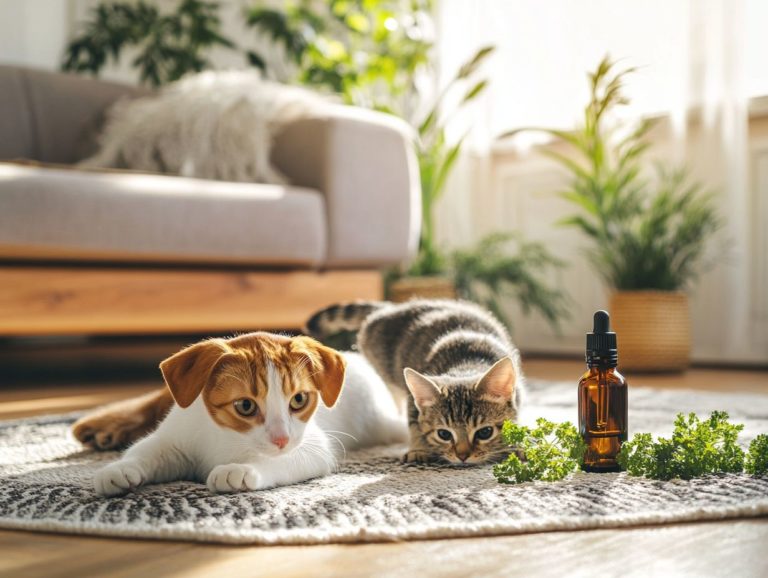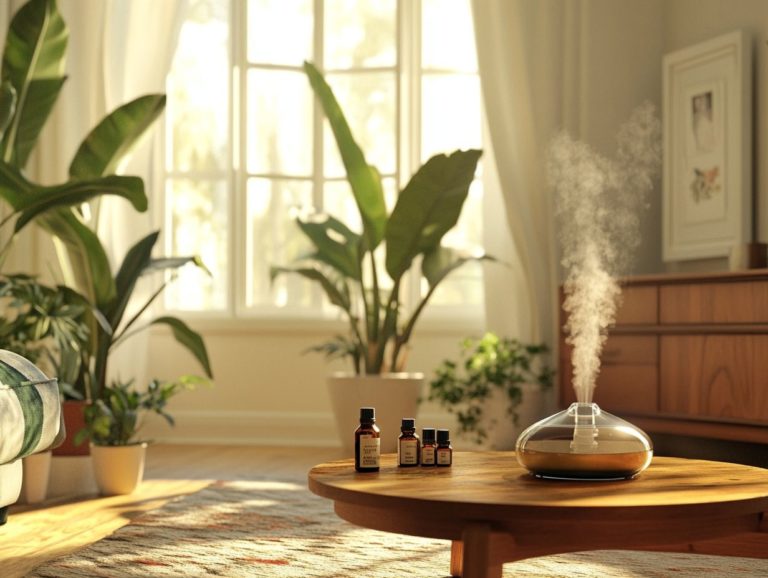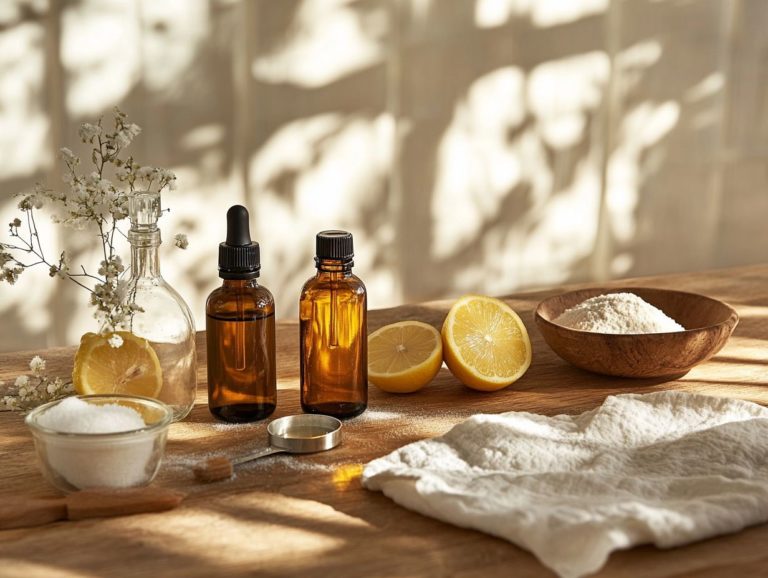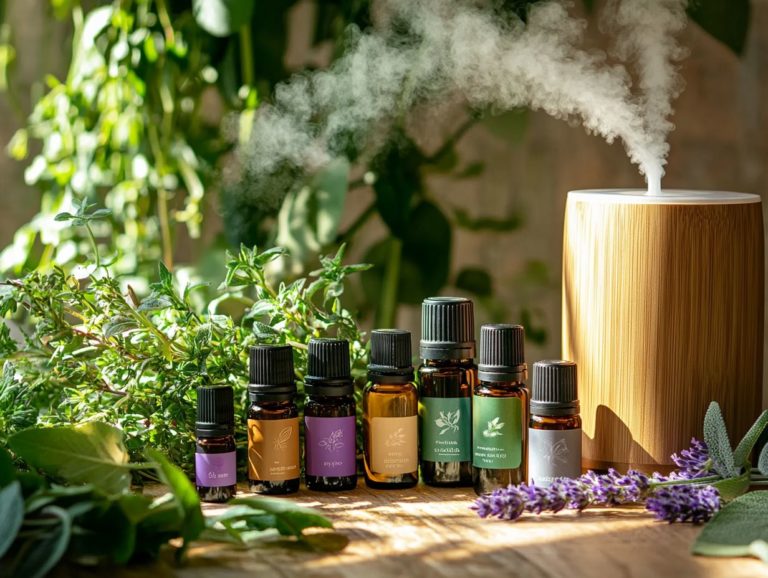Top 5 Essential Oils for Disinfecting Surfaces
Today, cleanliness and hygiene are more important than ever. Essential oils present a natural and highly effective approach to disinfecting surfaces, offering a refreshing and eco-friendly alternative to chemical cleaners.
This article delves into the top five essential oils Tea Tree, Lemon, Eucalyptus, Peppermint, and Lavender that not only smell great but also fight germs. This article explains how these oils work, their efficacy as disinfectants, and practical tips for seamlessly integrating them into your cleaning routine.
Moreover, we ll uncover the versatile uses these aromatic oils offer, including their role in homemade cleaning products. Get ready to harness nature’s power and transform your home into a cleaner, fresher haven!
Contents
- Key Takeaways:
- 1. Tea Tree Oil
- 2. Lemon Oil
- 3. Eucalyptus Oil
- 4. Peppermint Oil
- 5. Lavender Oil
- What Are Essential Oils and How Do They Work?
- Frequently Asked Questions
- 1. What are the top 5 essential oils for disinfecting surfaces?
- 2. Why are these essential oils effective in disinfecting surfaces?
- 3. How do I use essential oils for disinfecting surfaces?
- 4. Can I use any essential oil for disinfecting surfaces?
- 5. Are essential oils safe to use for disinfecting surfaces?
- 6. Can I mix different essential oils for disinfecting surfaces?
Key Takeaways:
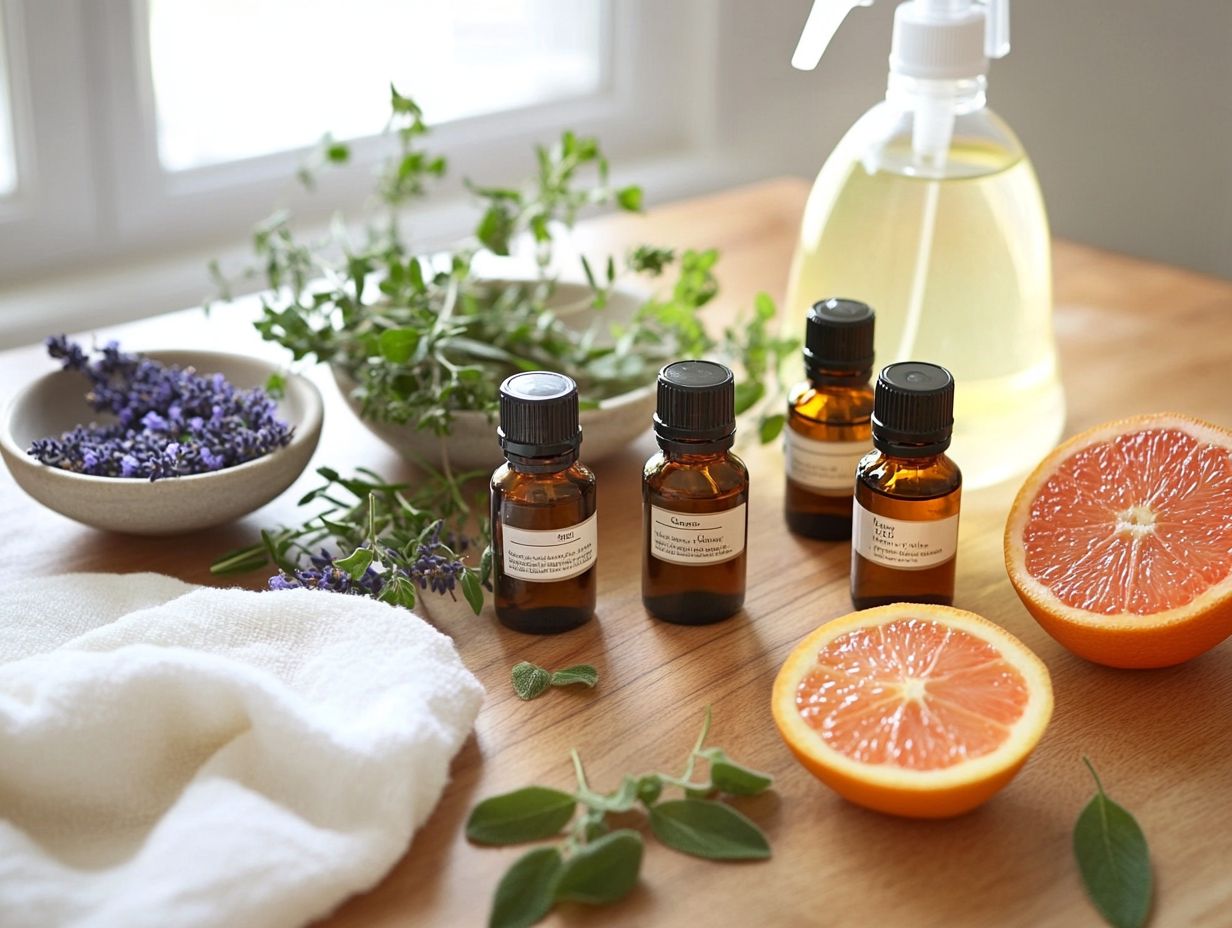
- Tea Tree Oil is a potent disinfectant that can effectively kill bacteria, viruses, and fungi on surfaces.
- Lemon Oil has powerful bacteria-fighting qualities, making it a great natural alternative to harsh chemical cleaners.
- Eucalyptus Oil contains compounds that have strong germ-killing abilities, making it an effective disinfectant for surfaces.
- Peppermint Oil has antimicrobial properties and a refreshing scent, making it a great choice for disinfecting surfaces in kitchen and bathroom areas, and is also highly effective in fresh laundry.
- Lavender Oil is a natural disinfectant that can also help to reduce stress and promote a sense of relaxation in the home.
1. Tea Tree Oil
Tea tree oil, sourced from the leaves of the Melaleuca alternifolia tree, is celebrated for its remarkable bacteria-fighting qualities. This makes it an essential ingredient in natural cleaning solutions that not only disinfect household surfaces but also foster a healthier home environment.
Its unique antimicrobial characteristics position tea tree oil as a formidable ally in the battle against germs and bacteria that frequently inhabit kitchens and bathrooms. You can seamlessly incorporate it into your DIY cleaning products, such as all-purpose sprays or even homemade laundry detergents, amplifying their disinfecting prowess.
Combine tea tree oil with a solution of vinegar and water to help eradicate stubborn stains while imparting a delightful, refreshing scent. Many individuals have discovered its effectiveness in combating mold and mildew, thanks to its germ-fighting qualities, ensuring a cleaner, fresher space. You can also add a few drops of peppermint oil for enhanced antibacterial properties and a more invigorating scent.
2. Lemon Oil
Lemon oil, derived from the zest of lemons, stands out as a favored choice for natural cleaning. Its invigorating scent combined with potent antibacterial properties makes it an exceptional ingredient in your homemade cleaners, capable of both disinfecting and leaving a revitalizing aroma throughout your home.
Lemon oil is particularly effective when combined with other citrus oils like grapefruit oil for enhanced cleaning power. This natural oil presents a multitude of benefits, particularly when used in non-toxic cleaning solutions that are safe for both the environment and your health.
You will find that lemon oil excels in breaking down grease and grime, making it an ideal companion for your kitchen surfaces. Additionally, its air-purifying abilities enhance indoor air quality, contributing to a more pleasant living environment. It is also an excellent ingredient for DIY disinfectant sprays.
By incorporating lemon oil into various DIY cleaning recipes like multi-surface sprays or freshening agents you can effectively harness its power, ensuring your home not only sparkles but also emanates a delightful fragrance. This makes it a valuable addition to any eco-conscious cleaning routine.
Using essential oils is a fantastic way to keep your home clean and fresh. They not only disinfect but also create a pleasant atmosphere that you’ll love.
3. Eucalyptus Oil
Eucalyptus oil is celebrated for its invigorating scent and strong germ-fighting qualities. It serves as a formidable ally in your quest for home hygiene. This natural disinfectant purifies the air while eliminating bacteria from your household surfaces. Eucalyptus oil is a must-have in any collection of safe cleaning products.
This essential oil not only enhances your cleaning routine with its delightful aroma but also acts as a natural odor neutralizer. It’s perfect for spaces like kitchens and bathrooms. Incorporating eucalyptus oil into your daily cleaning practices can combat unwanted odors and foster a refreshing atmosphere throughout your home. Try adding eucalyptus oil to your cleaning routine today and experience the difference!
DIY Kitchen Cleaner:
Mix half a cup of vinegar, a cup of water, and ten drops of eucalyptus oil in a spray bottle.
Bathroom Scrub:
Combine a few drops of eucalyptus oil with baking soda for an effective scrub that disinfects and freshens surfaces.
Its versatility makes maintaining a clean and healthy home an enjoyable and aromatic experience.
4. Peppermint Oil
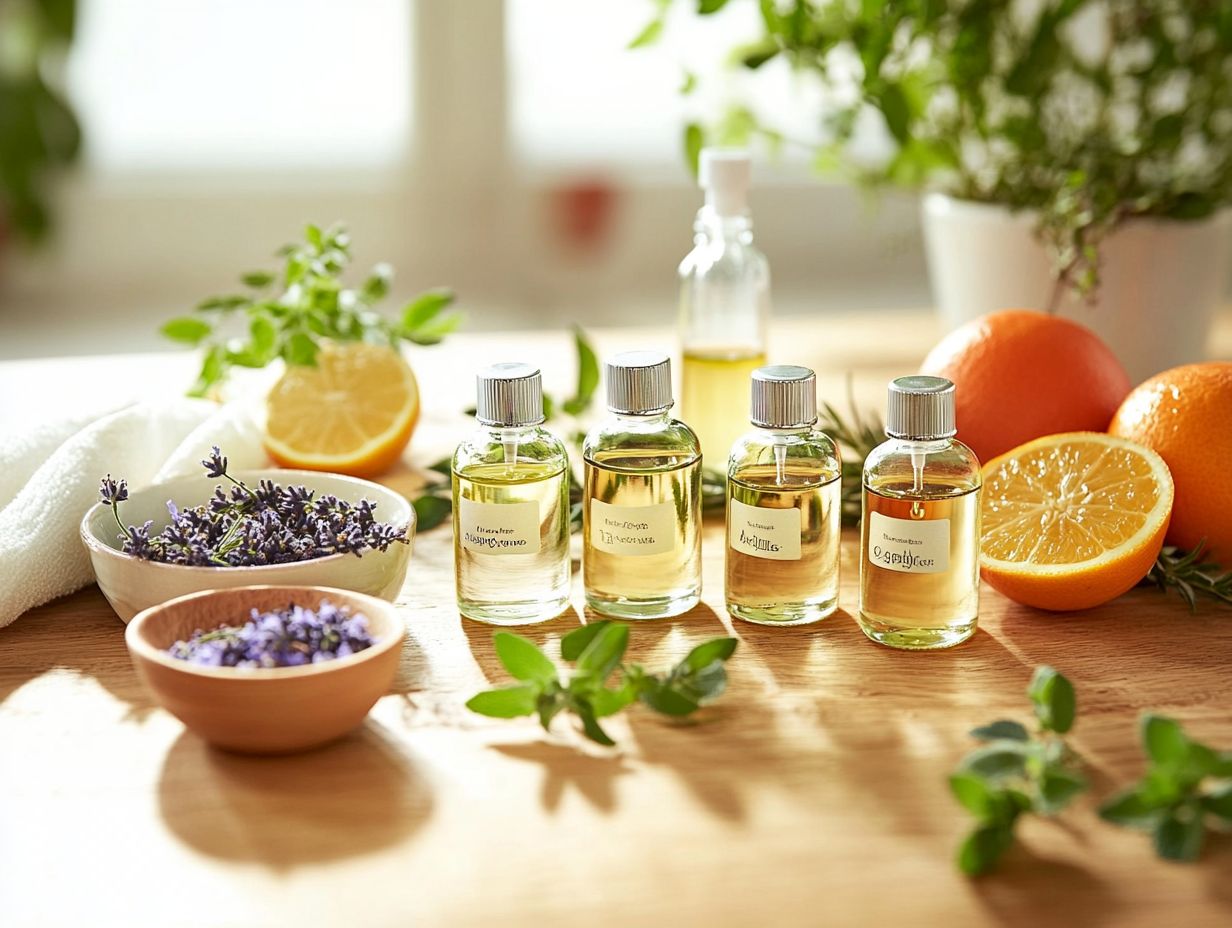
Peppermint oil is renowned for its refreshing aroma and antibacterial properties. It invigorates your senses and serves as an effective natural cleaning solution that combats dust, dirt, and germs throughout your home. Its versatility makes it perfect for DIY recipes aimed at eliminating bacteria.
This essential oil elevates your laundry routine by imparting a delightful, crisp scent to your clothes while providing antibacterial benefits that keep fabrics fresh. As a non-toxic alternative, peppermint oil allows you to maintain a clean home without exposing your family to harsh chemicals, making it ideal for families and eco-conscious individuals. You can also combine peppermint oil with other essential oils for enhanced cleaning efficacy.
By incorporating peppermint oil into spray bottles or laundry detergents, you can create an inviting atmosphere that promotes well-being. This demonstrates how nature can seamlessly enhance your cleaning practices in any setting.
5. Lavender Oil
Lavender oil is known for its soothing aroma. It acts as an effective odor neutralizer, making it a must-have in your eco-friendly, natural cleaning arsenal. It s perfect for those who prioritize organic oils in their household cleaning.
Transform your cleaning routine by adding this amazing essential oil to your DIY recipes! Imagine adding a few drops to your homemade all-purpose cleaners or infusing your laundry with its floral scent lavender oil truly works wonders. This essential oil also enhances the scent of your home environment.
For Your Laundry:
Mix lavender oil with baking soda to amplify freshness.
Lavender-Infused Fabric Spray:
Keep your linens and cushions smelling delightful.
Embracing lavender oil not only elevates your home s cleanliness but also cultivates a serene atmosphere for relaxation and rejuvenation after a long day.
Explore the power of nature with these essential oils and transform your home into a haven of cleanliness and freshness!
What Are Essential Oils and How Do They Work?
Essential oils are concentrated plant extracts that beautifully capture the aromatic essence of nature. They offer a range of benefits for cleaning due to their antibacterial properties and their role as safe alternatives to conventional cleaning agents. You can easily craft your own DIY disinfectant solutions for various household tasks. The use of organic oils enhances their effectiveness and safety.
These oils are extracted using methods such as steam distillation (a method that uses steam to extract oils from plants), cold pressing, or solvent extraction, which preserve their powerful characteristics. When you incorporate essential oils like tea tree, lavender, and eucalyptus into your cleaning routine, you not only enjoy a refreshing scent but also benefit from their natural antiseptic qualities that combat bacteria and viruses. This makes them effective for cleaning.
This makes them a fantastic choice for maintaining a clean home without using harsh chemicals commonly found in commercial cleaning products. By integrating these natural agents into your cleaning routines, you can create a safer and healthier living environment, effectively addressing dirt and grime while promoting your overall wellness.
What Makes Essential Oils Effective Disinfectants?
The effectiveness of essential oils as disinfectants comes from their remarkable antibacterial properties, allowing you to eliminate harmful bacteria and pathogens. They serve as a powerful and natural alternative to conventional cleaning products. Peppermint oil and clove oil are particularly known for their potent germ-fighting capabilities.
Take tea tree oil, for example. Its high terpinen-4-ol content has been shown in studies to effectively reduce the growth of Staphylococcus aureus on surfaces. Lavender oil doesn t just fill the air with a delightful fragrance; research demonstrates its significant antimicrobial activity, achieving a 99% reduction of bacteria on treated surfaces. Eucalyptus oil is another standout, boasting exceptional efficacy against various germs, making it an excellent choice for anyone pursuing chemical-free cleaning solutions.
According to a report from the Journal of Essential Oil Research, using these oils can dramatically decrease microbial presence, fostering a healthier indoor environment for you and your loved ones. The Harvard School of Public Health and the American Lung Association suggest that minimizing harsh chemicals in favor of natural alternatives like essential oils can significantly improve air quality and reduce respiratory illnesses.
How Can Essential Oils Be Used to Disinfect Surfaces?
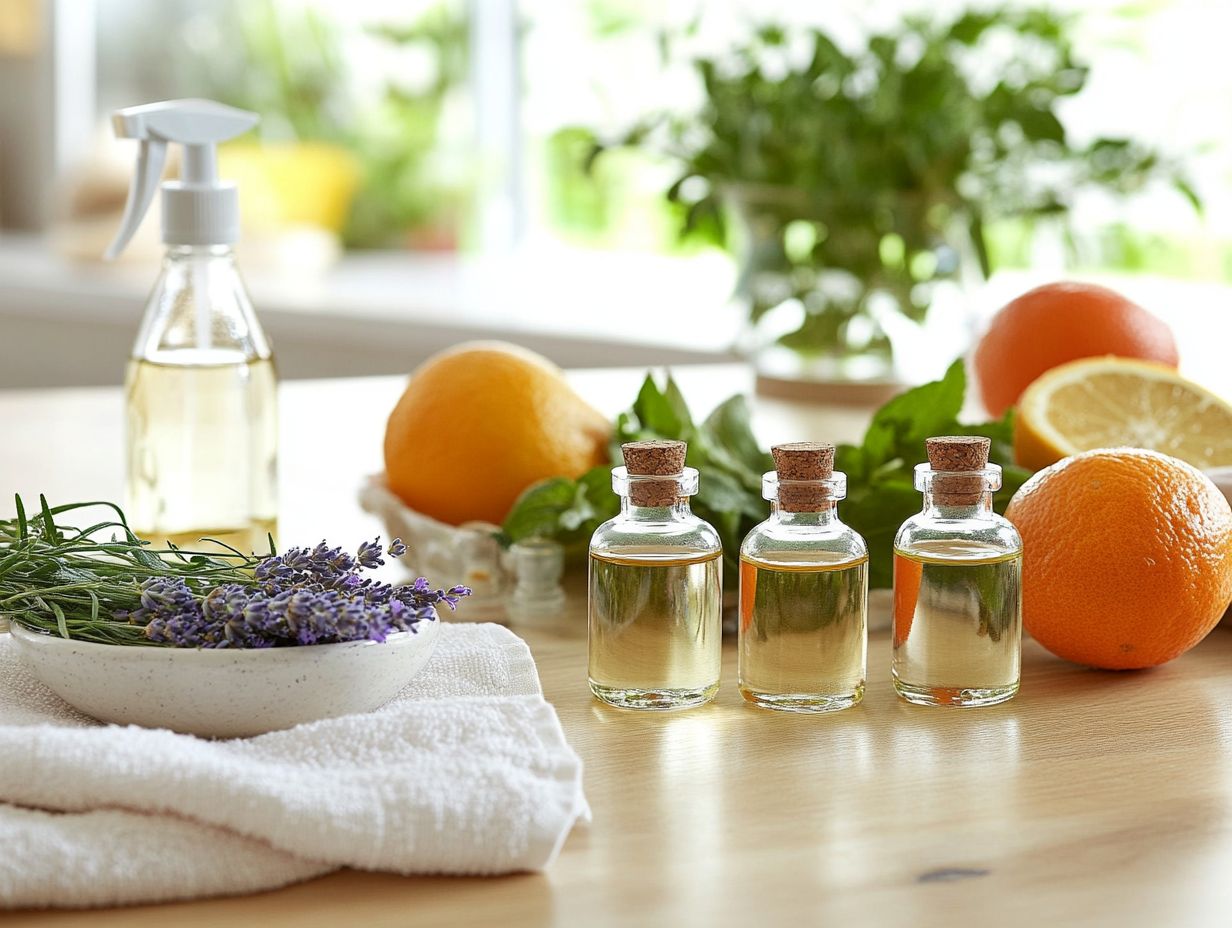
Essential oils can be a game-changer for disinfecting surfaces, and you can easily incorporate them into your DIY cleaning solutions. These mixtures provide germ-fighting capabilities and leave behind delightful aromas that elevate your home environment. Making your own cleaning products with essential oils like eucalyptus, tea tree, and lavender can be both effective and rewarding.
Creating your own cleaning products at home is a smart choice, as it saves you money and helps you avoid harmful chemicals found in commercial cleaners. Start by selecting essential oils known for their disinfectant properties, such as those from brands like Kashmere Essential Oils.
For kitchen surfaces, consider using tea tree oil its antibacterial effects are powerful.
A blend of lemon oil can work wonders in brightening and degreasing, while lavender oil provides a calming scent that s perfect for the bathroom. Mix these essential oils with simple ingredients like distilled white vinegar and water in a spray bottle, giving it a good shake before each use.
This natural approach keeps your home sparkling clean and fosters a healthier living space for you and your family. Try making your own cleaning solutions today and experience the benefits of essential oils for yourself!
Are There Any Risks or Precautions When Using Essential Oils for Disinfection?
Be cautious! Essential oils can be powerful but come with risks. While they offer many benefits as natural disinfectants, it’s crucial to consider potential skin sensitivities, ensure proper dilution, and select safe cleaning products to maintain safe cleaning practices in your home.
Allergic reactions can occur when certain oils contact your skin or are inhaled, especially if you have allergies or asthma. Respiratory issues can arise if you diffuse essential oils in small spaces without proper ventilation.
Always dilute your essential oils. Mix a few drops with a carrier oil before use.
If you’re pregnant, have infants, or possess underlying health conditions, consulting with healthcare professionals before using specific oils is a wise step, as some may pose risks to these sensitive groups.
How Can Essential Oils Be Incorporated into a Cleaning Routine?
Incorporating essential oils into your cleaning routine can greatly improve natural cleaning solutions, creating a healthier home environment. It makes cleaning more enjoyable and aromatic while fighting germs and odors.
By adding these delightful scents to your daily chores, you can create a more sustainable and eco-friendly atmosphere. For instance, whip up a simple all-purpose disinfectant by mixing vinegar, water, and a few drops of tea tree or lavender oil. This blend not only disinfects surfaces but also leaves a soothing aroma behind.
Add a few drops of lemon essential oil to your laundry to refresh your clothes while giving them antibacterial properties, making laundry day a sensory delight. Regularly using these oils helps maintain cleanliness and lifts your spirits, transforming mundane chores into uplifting rituals.
What Are Some Other Uses for These Essential Oils?
Beyond their cleaning abilities, essential oils have a wide range of applications that enhance the atmosphere and overall well-being of your home.
Diffuse these natural extracts to elevate your mood and create a serene ambiance, making them perfect for relaxation or meditation spaces. In your skincare routine, oils like lavender and tea tree can help promote clearer skin and soothe irritation.
Some essential oils, such as peppermint and eucalyptus, can effectively deter pests, keeping unwanted insects away while filling your home with a refreshing fragrance. By using these versatile oils in your daily life, you can boost your health and wellness while creating a more inviting and harmonious living space.
Frequently Asked Questions
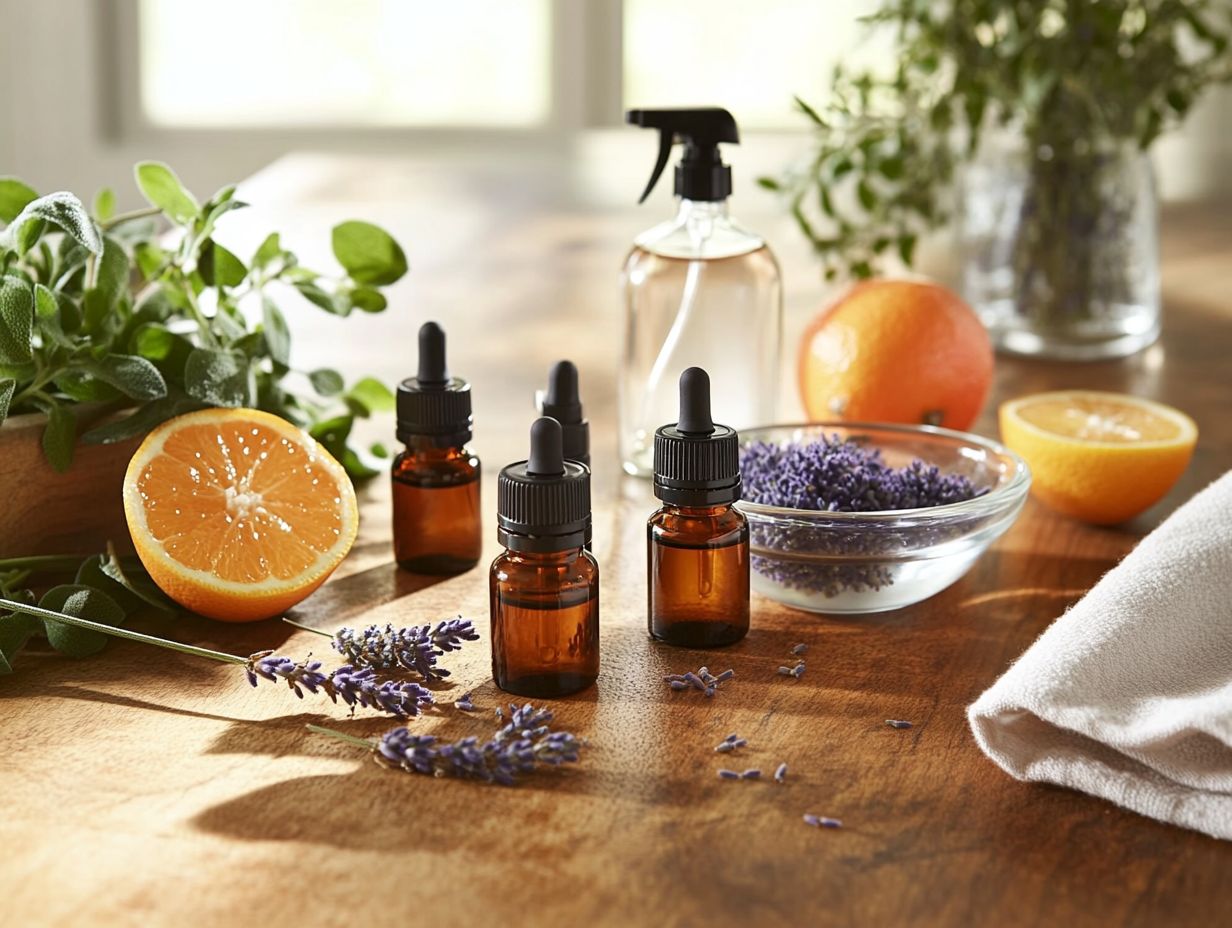
1. What are the top 5 essential oils for disinfecting surfaces?
Looking for the best disinfecting oils? Here are the top 5: tea tree, eucalyptus, lemon, peppermint, and lavender.
2. Why are these essential oils effective in disinfecting surfaces?
These essential oils contain natural antimicrobial properties that can kill bacteria, viruses, and fungi on surfaces.
3. How do I use essential oils for disinfecting surfaces?
You can dilute a few drops of essential oil in water and spray it on surfaces. You can also add a few drops to your cleaning solution or use it in a diffuser to purify the air.
4. Can I use any essential oil for disinfecting surfaces?
Not all essential oils have disinfecting properties, so it’s important to choose the right ones. The top 5 essential oils mentioned above are known for their disinfecting abilities.
5. Are essential oils safe to use for disinfecting surfaces?
Yes, essential oils are a natural and safe alternative to chemical disinfectants. However, it’s important to properly dilute them and avoid using them on sensitive materials.
Start experimenting with essential oils today for a cleaner and healthier home!
6. Can I mix different essential oils for disinfecting surfaces?
Essential oils are concentrated plant extracts that capture the natural fragrance and beneficial properties of various plants. Absolutely! Mixing essential oils can create a powerful disinfectant blend that leaves your surfaces sparkling clean.
Make sure to use oils that blend well together for effective cleaning. So, grab your favorite oils and start experimenting today for a fresher, cleaner home!

